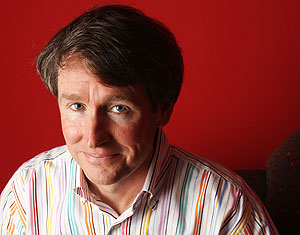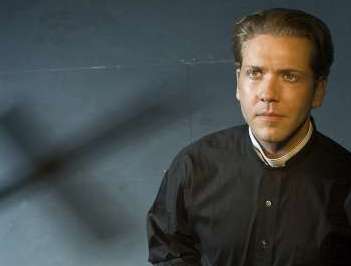book/daddy: October 2008 Archives

In The New Yorker, Malcolm Gladwell examines the popular tradition of the young genius:
Genius, in the popular conception, is inextricably tied up with precocity--doing something truly creative, we're inclined to think, requires the freshness and exuberance and energy of youth. Orson Welles made his masterpiece, "Citizen Kane," at twenty-five. Mozart wrote his breakthrough Piano Concerto No. 9 in E-Flat-Major at the age of twenty-one. In some creative forms, like lyric poetry, the importance of precocity has hardened into an iron law. How old was T. S. Eliot when he wrote "The Love Song of J. Alfred Prufrock" ("I grow old . . . I grow old")? Twenty-three. "Poets peak young," the creativity researcher James Kaufman maintains.
But studies have shown that this is simply not true, not true for lyric poetry, not true for music or literature. And Gladwell's leading example is Dallas' own Ben Fountain, a sweet guy whose terrific short story collection, Brief Encounters with Che Guevara, came out in 2006. book/daddy happily compared Ben's writing to Graham Greene -- albeit Graham Greene crossed with some South American magic realist..
But before you take heart -- you, in your cubicle, knowing that your brilliance at online poker will be recognized at any moment -- it's plain that as much as Ben's success is evidence that inspiration can strike later rather than earlier, it's testimony to his incredible persistence:
He quit his job at Akin, Gump in 1988. For every story he published in those early years, he had at least thirty rejections. The novel that he put away in a drawer took him four years. The dark period lasted for the entire second half of the nineteen-nineties. His breakthrough with "Brief Encounters" came in 2006, eighteen years after he first sat down to write at his kitchen table. The "young" writer from the provinces took the literary world by storm at the age of forty-eight.
It also didn't hurt that Ben had, in effect a patron -- his wife. Gladwell's point is that some insights come as "conceptual" breakthroughs -- the brilliant flash -- while others come incrementally, tentatively. And those artists need time (and support) to find their way.

The case of Rudy Kos,
the Dallas priest who was convicted of sexual assault in 1997, made
Dallas one of the first Catholic dioceses to be rocked by a sex abuse
scandal - one of the first of dozens of such scandals throughout the
church.
WaterTower Theatre in Addison deserves praise, then, for finally premiering Doubt in North Texas. Doubt is John Patrick Shanley's Pulitzer Prize (and Tony Award) -winning drama about a priest, who may be a pedophile, and the nun, the school principal, who sets out to bring him down. I say WaterTower is finally bringing the play here because we're getting to see Doubt two and a half years after it debuted in such places as Seattle, Singapore and New Zealand -- and only a few months before it opens as a Hollywood film.
Doubt is clearly inspired by the horrific raft of recent cases of pedophile priests and what often turned out to be the collusion of the Church hierarchy in covering up their crimes. It got so bad for the church that at one point, David Letterman joked that with the Gambinos gone, the Catholic Church was now the largest organized crime syndicate in the country. Shanley sets his drama in the Bronx in 1964, though. This permits Doubt to be separate, to explore its own case without entangling itself in all of the accusations and counter-accusations, the hundred-million dollar court settlements we've seen the past decade.
Yet it's impossible to un-learn what we learned in the '90s. It's impossible for us to watch Doubt without knowing what would follow, without seeing it through (broken) stained-glass windows.
